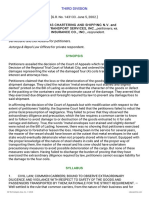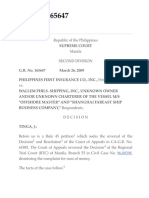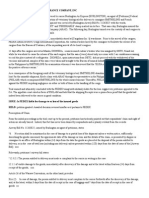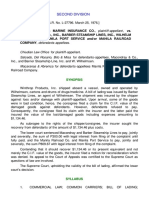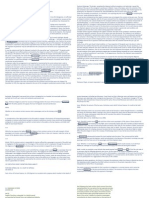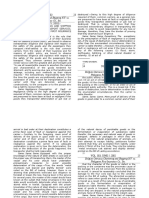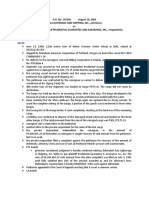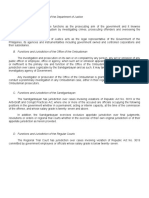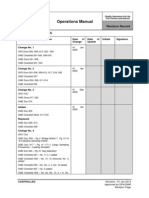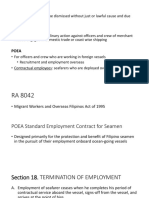0 ratings0% found this document useful (0 votes)
45 viewsDigest By: Nicole Kristine Dagohoy: Presumption of Negligence
Digest By: Nicole Kristine Dagohoy: Presumption of Negligence
Uploaded by
Nicole Dagohoy TaytayanPetitioners failed to rebut the presumption of negligence against them as common carriers.
1) Petitioners received the shipment in good condition in Germany but it arrived damaged in the Philippines.
2) Inspection reports and documents showed the coils were rusty and buckled upon arrival.
3) Analysis found the damaged coils were wet with fresh water.
4) Petitioners admitted being aware of the bad condition of the four coils upon arrival.
Copyright:
© All Rights Reserved
Available Formats
Download as DOCX, PDF, TXT or read online from Scribd
Digest By: Nicole Kristine Dagohoy: Presumption of Negligence
Digest By: Nicole Kristine Dagohoy: Presumption of Negligence
Uploaded by
Nicole Dagohoy Taytayan0 ratings0% found this document useful (0 votes)
45 views2 pagesPetitioners failed to rebut the presumption of negligence against them as common carriers.
1) Petitioners received the shipment in good condition in Germany but it arrived damaged in the Philippines.
2) Inspection reports and documents showed the coils were rusty and buckled upon arrival.
3) Analysis found the damaged coils were wet with fresh water.
4) Petitioners admitted being aware of the bad condition of the four coils upon arrival.
Original Title
BELGIAN vs. PHIL. FIRST INSURANCE
Copyright
© © All Rights Reserved
Available Formats
DOCX, PDF, TXT or read online from Scribd
Share this document
Did you find this document useful?
Is this content inappropriate?
Petitioners failed to rebut the presumption of negligence against them as common carriers.
1) Petitioners received the shipment in good condition in Germany but it arrived damaged in the Philippines.
2) Inspection reports and documents showed the coils were rusty and buckled upon arrival.
3) Analysis found the damaged coils were wet with fresh water.
4) Petitioners admitted being aware of the bad condition of the four coils upon arrival.
Copyright:
© All Rights Reserved
Available Formats
Download as DOCX, PDF, TXT or read online from Scribd
Download as docx, pdf, or txt
0 ratings0% found this document useful (0 votes)
45 views2 pagesDigest By: Nicole Kristine Dagohoy: Presumption of Negligence
Digest By: Nicole Kristine Dagohoy: Presumption of Negligence
Uploaded by
Nicole Dagohoy TaytayanPetitioners failed to rebut the presumption of negligence against them as common carriers.
1) Petitioners received the shipment in good condition in Germany but it arrived damaged in the Philippines.
2) Inspection reports and documents showed the coils were rusty and buckled upon arrival.
3) Analysis found the damaged coils were wet with fresh water.
4) Petitioners admitted being aware of the bad condition of the four coils upon arrival.
Copyright:
© All Rights Reserved
Available Formats
Download as DOCX, PDF, TXT or read online from Scribd
Download as docx, pdf, or txt
You are on page 1of 2
BELGIAN OVERSEAS CHARTERING AND SHIPPING N.V.
and handling and stowage, including such methods as their nature
JARDINE DAVIES TRANSPORT SERVICES, INC. vs. PHILIPPINE requires." The extraordinary responsibility lasts from the time
FIRST INSURANCE CO., INC. the goods are unconditionally placed in the possession of and
Digest by: Nicole Kristine Dagohoy received for transportation by the carrier until they are
delivered, actually or constructively, to the consignee or to the
Facts: On June 13, 1990, CMC Trading A.G. shipped on board person who has a right to receive them.
the M/V 'Anangel Sky' at Hamburg, Germany 242 coils of
various Prime Cold Rolled Steel sheets for transportation to This strict requirement is justified by the fact that, without a
Manila consigned to the Philippine Steel Trading Corporation. hand or a voice in the preparation of such contract, the riding
On July 28, 1990, M/V Anangel Sky arrived at the port of public enters into a contract of transportation with common
Manila and, within the subsequent days, discharged the subject carriers. Even if it wants to, it cannot submit its own stipulations
cargo. Four (4) coils were found to be in bad order B.O. Tally for their approval. Hence, it merely adheres to the agreement
sheet No. 154974. Finding the four (4) coils in their damaged prepared by them.
state to be unfit for the intended purpose, the consignee
Philippine Steel Trading Corporation declared the same as total Presumption of Negligence
loss. Owing to this high degree of diligence required of them,
common carriers, as a general rule, are presumed to have been
Despite receipt of a formal demand, defendants-appellees at fault or negligent if the goods they transported deteriorated
refused to submit to the consignee's claim. Consequently, or got lost or destroyed. That is, unless they prove that they
plaintiff-appellant paid the consignee five hundred six exercised extraordinary diligence in transporting the goods.19
thousand eighty six & 50/100 pesos (P506,086.50), and was In order to avoid responsibility for any loss or damage,
subrogated to the latter's rights and causes of action against therefore, they have the burden of proving that they observed
defendants-appellees. Subsequently, plaintiff-appellant such diligence.
instituted this complaint for recovery of the amount paid by
them, to the consignee as insured. Exception to the presumption of Negligence
However, the presumption of fault or negligence will not arise
Impugning the propriety of the suit against them, defendants- if the loss is due to any of the following causes: (1) flood,
appellees imputed that the damage and/or loss was due to storm, earthquake, lightning, or other natural disaster or
pre-shipment damage, to the inherent nature, vice or defect of calamity; (2) an act of the public enemy in war, whether
the goods, or to perils, danger and accidents of the sea, or to international or civil; (3) an act or omission of the shipper or
insufficiency of packing thereof, or to the act or omission of the owner of the goods; (4) the character of the goods or defects in
shipper of the goods or their representatives. In addition the packing or the container; or (5) an order or act of
thereto, defendants-appellees argued that their liability, if there competent public authority. This is a closed list. If the cause of
be any, should not exceed the limitations of liability provided destruction, loss or deterioration is other than the enumerated
for in the bill of lading and other pertinent laws. Finally, circumstances, then the carrier is liable therefor.
defendants-appellees averred that, in any event, they exercised
due diligence and foresight required by law to prevent any Corollary to the foregoing, mere proof of delivery of the goods
damage/loss to said shipment. in good order to a common carrier and of their arrival in bad
order at their destination constitutes a prima facie case of fault
Issue: Whether or not petitioner have overcome the or negligence against the carrier. If no adequate explanation is
presumption of negligence of a common carrier. –NO. given as to how the deterioration, the loss or the destruction of
the goods happened, the transporter shall be held responsible.
Ruling: Petitioners contend that the presumption of fault
imposed on common carriers should not be applied on the Held: That petitioners failed to rebut the prima facie
basis of the lone testimony offered by private respondent. The presumption of negligence is revealed in the case at bar by a
contention is untenable. review of the records and more so by the evidence adduced by
respondent.
Well-settled is the rule that common carriers, from the nature
of their business and for reasons of public policy, are bound to 1. As stated in the Bill of Lading, petitioners received the
observe extraordinary diligence and vigilance with respect to subject shipment in good order and condition in
the safety of the goods and the passengers they transport.13 Hamburg, Germany.
Thus, common carriers are required to render service with the 2. Prior to the unloading of the cargo, an Inspection
greatest skill and foresight and "to use all reason[a]ble means Report prepared and signed by representatives of
to ascertain the nature and characteristics of the goods both parties showed the steel bands broken, the
tendered for shipment, and to exercise due care in the
metal envelopes rust-stained and heavily buckled, and
the contents thereof exposed and rusty.
3. Bad Order Tally Sheet No. 15497928 issued by Jardine
Davies Transport Services, Inc., stated that the four
coils were in bad order and condition. Normally, a
request for a bad order survey is made in case there is
an apparent or a presumed loss or damage.
4. The Certificate of Analysis30 stated that, based on the
sample submitted and tested, the steel sheets found
in bad order were wet with fresh water.
5. Petitioners -- in a letter addressed to the Philippine
Steel Coating Corporation and dated October 12,
1990 -- admitted that they were aware of the
condition of the four coils found in bad order and
condition.
You might also like
- DRAFT SPA JP54 Qty 10 Mil BBL x12 Months From NaMGo16 07Document23 pagesDRAFT SPA JP54 Qty 10 Mil BBL x12 Months From NaMGo16 07ben50% (2)
- The Embarkation Disembarkation of Pilots - Code Final PMSC SGDocument15 pagesThe Embarkation Disembarkation of Pilots - Code Final PMSC SGMarcoDekkerNo ratings yet
- Belgian Overseas Chartering and Shipping N.V. vs. Philippine FirstDocument2 pagesBelgian Overseas Chartering and Shipping N.V. vs. Philippine FirstRhea CalabinesNo ratings yet
- TranspoDocument10 pagesTransponikkadavidNo ratings yet
- G.R. No. 143133 Belgian V Phil FirstDocument13 pagesG.R. No. 143133 Belgian V Phil FirstOjie SantillanNo ratings yet
- Transpo Cases 1Document27 pagesTranspo Cases 1Christine Joy EstropiaNo ratings yet
- Belgian Overseas vs. Phil First InsuranceDocument2 pagesBelgian Overseas vs. Phil First InsuranceJanlo FevidalNo ratings yet
- Belgian Overseas Chartering and Shipping vs. Philippines First InsuranceDocument6 pagesBelgian Overseas Chartering and Shipping vs. Philippines First InsuranceVincent Rey BernardoNo ratings yet
- Belgian Vs PH First Insurance With Case DigestDocument9 pagesBelgian Vs PH First Insurance With Case DigestteepeeNo ratings yet
- TL - Belgian Overseas Chartering and Shipping, Et - Al Vs Phil First Insurance, GR No. 143133 June 5, 2002Document9 pagesTL - Belgian Overseas Chartering and Shipping, Et - Al Vs Phil First Insurance, GR No. 143133 June 5, 2002Jec Luceriaga BiraquitNo ratings yet
- 2002 Belgian Overseas Chartering Shipping N.v.20160304 903 Htnj54Document16 pages2002 Belgian Overseas Chartering Shipping N.v.20160304 903 Htnj54michelledugsNo ratings yet
- Panganiban, J.Document5 pagesPanganiban, J.Wonder WomanNo ratings yet
- Belgian Overseas Chartering Shipping Vs Phil Insurance CoDocument12 pagesBelgian Overseas Chartering Shipping Vs Phil Insurance CoJessica WuNo ratings yet
- 016 Belgian Overseas Chartering and Shipping, N.V. v. Phil. First Ins. Co.Document2 pages016 Belgian Overseas Chartering and Shipping, N.V. v. Phil. First Ins. Co.thornapple25No ratings yet
- Belgian Overseas v. Philippine First InsuranceDocument10 pagesBelgian Overseas v. Philippine First InsuranceAthina Maricar CabaseNo ratings yet
- 2 Belgian Overseas Chartering vs. Phil. First Insurance, 383 SCRA 23Document24 pages2 Belgian Overseas Chartering vs. Phil. First Insurance, 383 SCRA 23blessaraynesNo ratings yet
- Belgian Overseas Chartering and Shipping N.V. and Jardine Davies Transport Services, Inc., Petitioners, vs. Philippine First Insurance Co., IncDocument157 pagesBelgian Overseas Chartering and Shipping N.V. and Jardine Davies Transport Services, Inc., Petitioners, vs. Philippine First Insurance Co., IncAngelica Joyce DyNo ratings yet
- G.R. No. 165647Document19 pagesG.R. No. 165647Ej CalaorNo ratings yet
- Transpo Law Case Digest-Vigilance Over GoodsDocument3 pagesTranspo Law Case Digest-Vigilance Over GoodsKatherinePolinasSadioaNo ratings yet
- Feb 1 DigestsDocument15 pagesFeb 1 DigestsMartee BaldonadoNo ratings yet
- (d8) Philippines First Insurance Co., Inc. Vs Wallem Phils. Shipping, Inc.Document4 pages(d8) Philippines First Insurance Co., Inc. Vs Wallem Phils. Shipping, Inc.MhaliNo ratings yet
- Transpo Case DigestDocument10 pagesTranspo Case DigestSam FajardoNo ratings yet
- Marine Insurance CasesDocument13 pagesMarine Insurance CasesEvitha Bernabe-RodriguezNo ratings yet
- Transpo Case DigestDocument10 pagesTranspo Case DigestSam FajardoNo ratings yet
- Transpo Common CarriersDocument138 pagesTranspo Common CarriersHannah Keziah Dela CernaNo ratings yet
- Belgian Overseas Chartering and Shipping NDocument3 pagesBelgian Overseas Chartering and Shipping NLatjing SolimanNo ratings yet
- 056 - Planters Products, Inc. v. CA Case DigestDocument12 pages056 - Planters Products, Inc. v. CA Case DigestLaw StudentNo ratings yet
- Phil FirstDocument4 pagesPhil FirstSheila GarciaNo ratings yet
- 1âwphi1.nêt: Calvo v. UCPB General Ins. Co., G.R. No. 148496, Mar. 19, 2002Document11 pages1âwphi1.nêt: Calvo v. UCPB General Ins. Co., G.R. No. 148496, Mar. 19, 2002LizzzNo ratings yet
- Belgian Overseas Chartering and Shipping NV V Philippine First InsuranceDocument25 pagesBelgian Overseas Chartering and Shipping NV V Philippine First InsuranceRuby SantillanaNo ratings yet
- 29) Phil First Ins Co., Inc. vs. Wallem Phils. Shipping, Inc., Et Al. G.R. No. 165647, March 26, 2009Document7 pages29) Phil First Ins Co., Inc. vs. Wallem Phils. Shipping, Inc., Et Al. G.R. No. 165647, March 26, 2009S.G.T.No ratings yet
- Belgian Chartering v. Philippine First InsuranceDocument23 pagesBelgian Chartering v. Philippine First InsuranceMonica Bolado-AsuncionNo ratings yet
- Digests 10152020Document60 pagesDigests 10152020Angelica Joyce DyNo ratings yet
- Calvo v. UCPB General Insurance (148496)Document3 pagesCalvo v. UCPB General Insurance (148496)Josef MacanasNo ratings yet
- Transpo (6 Jul 15)Document15 pagesTranspo (6 Jul 15)Gian CarloNo ratings yet
- Transpo 4 Coastwise Lighterage Corporation V. CaDocument3 pagesTranspo 4 Coastwise Lighterage Corporation V. CaJILL SEBALLOSNo ratings yet
- Batch 2 - Transpo - Case DigestDocument31 pagesBatch 2 - Transpo - Case DigestRaniele MarquezNo ratings yet
- Transpo After PrelimsDocument65 pagesTranspo After PrelimsRonna Faith MonzonNo ratings yet
- Transpo - 2Document60 pagesTranspo - 2YsabelleNo ratings yet
- Calvo Vs UCPB Gen Insurance - G.R. No. 148496. March 19, 2002Document6 pagesCalvo Vs UCPB Gen Insurance - G.R. No. 148496. March 19, 2002Ebbe DyNo ratings yet
- Sveriges Angfartygs Assurans Forening, Plaintiff-Appellant, vs. Qua Chee Gan, Defendant-Appellee. FactsDocument17 pagesSveriges Angfartygs Assurans Forening, Plaintiff-Appellant, vs. Qua Chee Gan, Defendant-Appellee. FactsMary Ann IsananNo ratings yet
- St. Paul Fire & Marine Insurance Co. v. Macondray & Co., Inc.Document7 pagesSt. Paul Fire & Marine Insurance Co. v. Macondray & Co., Inc.Duffy DuffyNo ratings yet
- 1 St. - Paul - Fire - Marine - Insurance - Co. - V.20181216-5466-1h1ola3 PDFDocument6 pages1 St. - Paul - Fire - Marine - Insurance - Co. - V.20181216-5466-1h1ola3 PDFSarah C.No ratings yet
- Planters Products Inc Vs CADocument5 pagesPlanters Products Inc Vs CARitz Esguerra BabistaNo ratings yet
- Chapter 2 17-32 CasesDocument23 pagesChapter 2 17-32 Casesaxel_adaya7393No ratings yet
- Eastern Shipping Lines vs. CA Case DigestDocument1 pageEastern Shipping Lines vs. CA Case DigestReth Guevarra100% (1)
- Sveriges Angfartygs Assurans Forening, Plaintiff-Appellant, vs. Qua Chee Gan, Defendant-Appellee. FactsDocument17 pagesSveriges Angfartygs Assurans Forening, Plaintiff-Appellant, vs. Qua Chee Gan, Defendant-Appellee. Factsyannie isananNo ratings yet
- 128570-1993-Planters Products Inc. v. Court of AppealsDocument10 pages128570-1993-Planters Products Inc. v. Court of Appealsblude cosingNo ratings yet
- Transportation CASESDocument27 pagesTransportation CASESGhadahNo ratings yet
- Digest - Belgian Overseas vs. Phil First InsuranceDocument2 pagesDigest - Belgian Overseas vs. Phil First InsurancePaul Vincent Cunanan100% (4)
- Belgian Overseas Chartering and Shipping N.V. vs. Philippine First Insurance Co., Inc.Document16 pagesBelgian Overseas Chartering and Shipping N.V. vs. Philippine First Insurance Co., Inc.Lance Christian ZoletaNo ratings yet
- Asia Lighterage Shipping Inc. Vs CADocument3 pagesAsia Lighterage Shipping Inc. Vs CAValentine MoralesNo ratings yet
- Transpo Law Case Digest - Bajana - 2hDocument23 pagesTranspo Law Case Digest - Bajana - 2hArisa BajanaNo ratings yet
- Module 3 Transpo Law 405Document46 pagesModule 3 Transpo Law 405Jandi YangNo ratings yet
- Central Shipping Company Vs Insurance Company of North America Case DigestDocument36 pagesCentral Shipping Company Vs Insurance Company of North America Case DigestJoshua ParilNo ratings yet
- Central Shipping Company Vs Insurance Company of North America Case DigestDocument20 pagesCentral Shipping Company Vs Insurance Company of North America Case DigestJoshua ParilNo ratings yet
- Central Shipping Company Vs Insurance Company of North America Case DigestDocument43 pagesCentral Shipping Company Vs Insurance Company of North America Case DigestJoshua ParilNo ratings yet
- Central Shipping Company Vs Insurance Company of North America Case DigestDocument60 pagesCentral Shipping Company Vs Insurance Company of North America Case DigestJoshua ParilNo ratings yet
- Central Shipping Company Vs Insurance Company of North America Case DigestDocument21 pagesCentral Shipping Company Vs Insurance Company of North America Case DigestJoshua ParilNo ratings yet
- Central Shipping Company Vs Insurance Company of North America Case DigestDocument13 pagesCentral Shipping Company Vs Insurance Company of North America Case DigestJoshua ParilNo ratings yet
- Central Shipping Company Vs Insurance Company of North America Case DigestDocument60 pagesCentral Shipping Company Vs Insurance Company of North America Case DigestJoshua ParilNo ratings yet
- Performance Disputes in Shipping: A Collection of Case Notes from IndiaFrom EverandPerformance Disputes in Shipping: A Collection of Case Notes from IndiaNo ratings yet
- Cases 1-10Document59 pagesCases 1-10Nicole Dagohoy TaytayanNo ratings yet
- Case 1Document11 pagesCase 1Nicole Dagohoy TaytayanNo ratings yet
- Case Digest 1Document11 pagesCase Digest 1Nicole Dagohoy Taytayan100% (1)
- Samahan NG Manggagawa Sa Hanjin ShipyardDocument4 pagesSamahan NG Manggagawa Sa Hanjin ShipyardNicole Dagohoy TaytayanNo ratings yet
- Holy Child vs. Sto. Tomas DigestDocument5 pagesHoly Child vs. Sto. Tomas DigestNicole Dagohoy TaytayanNo ratings yet
- 1456 To 1457 ReportDocument2 pages1456 To 1457 ReportNicole Dagohoy TaytayanNo ratings yet
- Case Digest 1 - Eng PlusDocument2 pagesCase Digest 1 - Eng PlusNicole Dagohoy TaytayanNo ratings yet
- Case Compilation 1Document25 pagesCase Compilation 1Nicole Dagohoy TaytayanNo ratings yet
- Pantranco vs. BaesaDocument5 pagesPantranco vs. BaesaNicole Dagohoy TaytayanNo ratings yet
- Case 4Document5 pagesCase 4Nicole Dagohoy TaytayanNo ratings yet
- SUN INSURANCE OFFICE, LTD., Petitioner, vs. The Hon. Court of Appeals and Nerissa Lim, RespondentsDocument11 pagesSUN INSURANCE OFFICE, LTD., Petitioner, vs. The Hon. Court of Appeals and Nerissa Lim, RespondentsNicole Dagohoy TaytayanNo ratings yet
- Case 2Document22 pagesCase 2Nicole Dagohoy TaytayanNo ratings yet
- Picart vs. SmithDocument1 pagePicart vs. SmithNicole Dagohoy Taytayan100% (1)
- Nueva Ecija I Electric Cooperative, Inc. (NEECO-I) Employees Association vs. NLRC, G.R. No. 116066, January 24, 2000Document14 pagesNueva Ecija I Electric Cooperative, Inc. (NEECO-I) Employees Association vs. NLRC, G.R. No. 116066, January 24, 2000Nicole Dagohoy TaytayanNo ratings yet
- Case 3Document9 pagesCase 3Nicole Dagohoy TaytayanNo ratings yet
- Kapatiran Vs Calleja DigestDocument1 pageKapatiran Vs Calleja DigestNicole Dagohoy TaytayanNo ratings yet
- Northwest Airlines V ChiongDocument2 pagesNorthwest Airlines V ChiongNicole Dagohoy TaytayanNo ratings yet
- Department Order No. 40-B-03: Amending The Implementing Rules of Book V of The Labor Code of The PhilippinesDocument2 pagesDepartment Order No. 40-B-03: Amending The Implementing Rules of Book V of The Labor Code of The PhilippinesNicole Dagohoy TaytayanNo ratings yet
- A. Functions and Jurisdiction of The Department of JusticeDocument1 pageA. Functions and Jurisdiction of The Department of JusticeNicole Dagohoy TaytayanNo ratings yet
- Office of The OmbudsmanDocument8 pagesOffice of The OmbudsmanNicole Dagohoy TaytayanNo ratings yet
- Reilo vs. San JoseDocument5 pagesReilo vs. San JoseNicole Dagohoy TaytayanNo ratings yet
- Goodland vs. BdoDocument5 pagesGoodland vs. BdoNicole Dagohoy TaytayanNo ratings yet
- Digest By: Paul Edison BatacanDocument1 pageDigest By: Paul Edison BatacanNicole Dagohoy TaytayanNo ratings yet
- Title Viii. - Lease General ProvisionsDocument3 pagesTitle Viii. - Lease General ProvisionsNicole Dagohoy TaytayanNo ratings yet
- Quileste vs. PeopleDocument2 pagesQuileste vs. PeopleNicole Dagohoy TaytayanNo ratings yet
- Logistics OutsourcingDocument7 pagesLogistics OutsourcingParminder Saluja100% (3)
- MartinCamacho PDFDocument4 pagesMartinCamacho PDFnormanwillowNo ratings yet
- The Role in Technology in Supply Chain ManagementDocument6 pagesThe Role in Technology in Supply Chain ManagementAnonymous MZRzaxFgVLNo ratings yet
- Vat-Exempt Transactions (Under TRAIN Law)Document2 pagesVat-Exempt Transactions (Under TRAIN Law)Fabiano JoeyNo ratings yet
- LD-384996 - LANDSTAR RANGER, InC. - Carrier Rate and Load ConfirmationDocument2 pagesLD-384996 - LANDSTAR RANGER, InC. - Carrier Rate and Load Confirmationnvn.nepNo ratings yet
- Navas Onthath CV 11.12.2018Document8 pagesNavas Onthath CV 11.12.2018NavasOT100% (1)
- Logistics of The Roman Grain TradeDocument18 pagesLogistics of The Roman Grain Tradefunny880710100% (2)
- CA Final Idt Smart Book in Just 240 Pages For May 24 As Per NewDocument28 pagesCA Final Idt Smart Book in Just 240 Pages For May 24 As Per NewKeshavNo ratings yet
- MEI Crating Operations v2Document17 pagesMEI Crating Operations v2Taylor RustNo ratings yet
- E CommerceDocument18 pagesE Commercemabdullah_asad9813No ratings yet
- Marking of Containers Carrying Dangerous CargoesDocument6 pagesMarking of Containers Carrying Dangerous CargoesClarence ClarNo ratings yet
- Alphaliner Newsletter No 23 - 2024 FullDocument24 pagesAlphaliner Newsletter No 23 - 2024 FullMarshall EdwardNo ratings yet
- Binghamton NY Press Grayscale 1912 - 1097Document1 pageBinghamton NY Press Grayscale 1912 - 1097TitanicwareNo ratings yet
- Attacking and Defending Through Operations - Fedex: Assignment Submitted By: Pradeep DevkarDocument14 pagesAttacking and Defending Through Operations - Fedex: Assignment Submitted By: Pradeep Devkarsim4misNo ratings yet
- Chapter 7Document4 pagesChapter 7thuhuyenn2309No ratings yet
- Schlage PB74 2013Document398 pagesSchlage PB74 2013Security Lock DistributorsNo ratings yet
- LPG Storage Systems Atmospheric Vs PressurisedDocument8 pagesLPG Storage Systems Atmospheric Vs Pressurisedraritylim100% (1)
- STELLANTIS FCA 856AdvanceShipNoticeDocument232 pagesSTELLANTIS FCA 856AdvanceShipNoticeJorge Luis Belaunzarán SierraNo ratings yet
- Technical InformationDocument8 pagesTechnical InformationishaqNo ratings yet
- GR MemoDocument43 pagesGR MemoaakankshaNo ratings yet
- ApplicationDocument5 pagesApplicationEulNo ratings yet
- Commissioning of Offshore Installations in Building YardsDocument79 pagesCommissioning of Offshore Installations in Building YardsJeff ZhangNo ratings yet
- BL TerminadoDocument2 pagesBL TerminadoAntonío IvailovNo ratings yet
- Pricing DecisionDocument10 pagesPricing DecisionVenkat RajuNo ratings yet
- Oil Tanker Operation ManualDocument462 pagesOil Tanker Operation ManualNikNik00188% (16)
- Sprice Supplier Contact Templates - ENDocument5 pagesSprice Supplier Contact Templates - ENJameelaNo ratings yet
- T-Bolt Closure Brochure - Aug 2013Document10 pagesT-Bolt Closure Brochure - Aug 2013Shamsir Ibni ShukriNo ratings yet
- Security of Tenure POEADocument33 pagesSecurity of Tenure POEAJovy Balangue MacadaegNo ratings yet










